E-Portfolio: Reflective Practice and Skills Development in Nursing
VerifiedAdded on 2021/05/31
|10
|2060
|53
Portfolio
AI Summary
This e-portfolio documents a nursing student's experiences and reflections on their practice, focusing on skills development, ethical considerations, and patient care. The portfolio includes reflections on situations where the student lacked knowledge, such as the 'do not resuscitate' policy, and outlines learning needs related to therapeutic communication, verbal and non-verbal communication skills, and cultural competency. It details learning experiences such as hand hygiene and manual handling training, as well as professional journal readings that highlight effective communication strategies. The student reflects on their adherence to ethical and legal standards, their teamwork, and their commitment to continuous professional development. The portfolio also includes reflections on a first aid course, emphasizing the importance of communication and therapeutic relationships alongside clinical skills in providing patient care. Action plans are detailed for developing the necessary skills for the future.
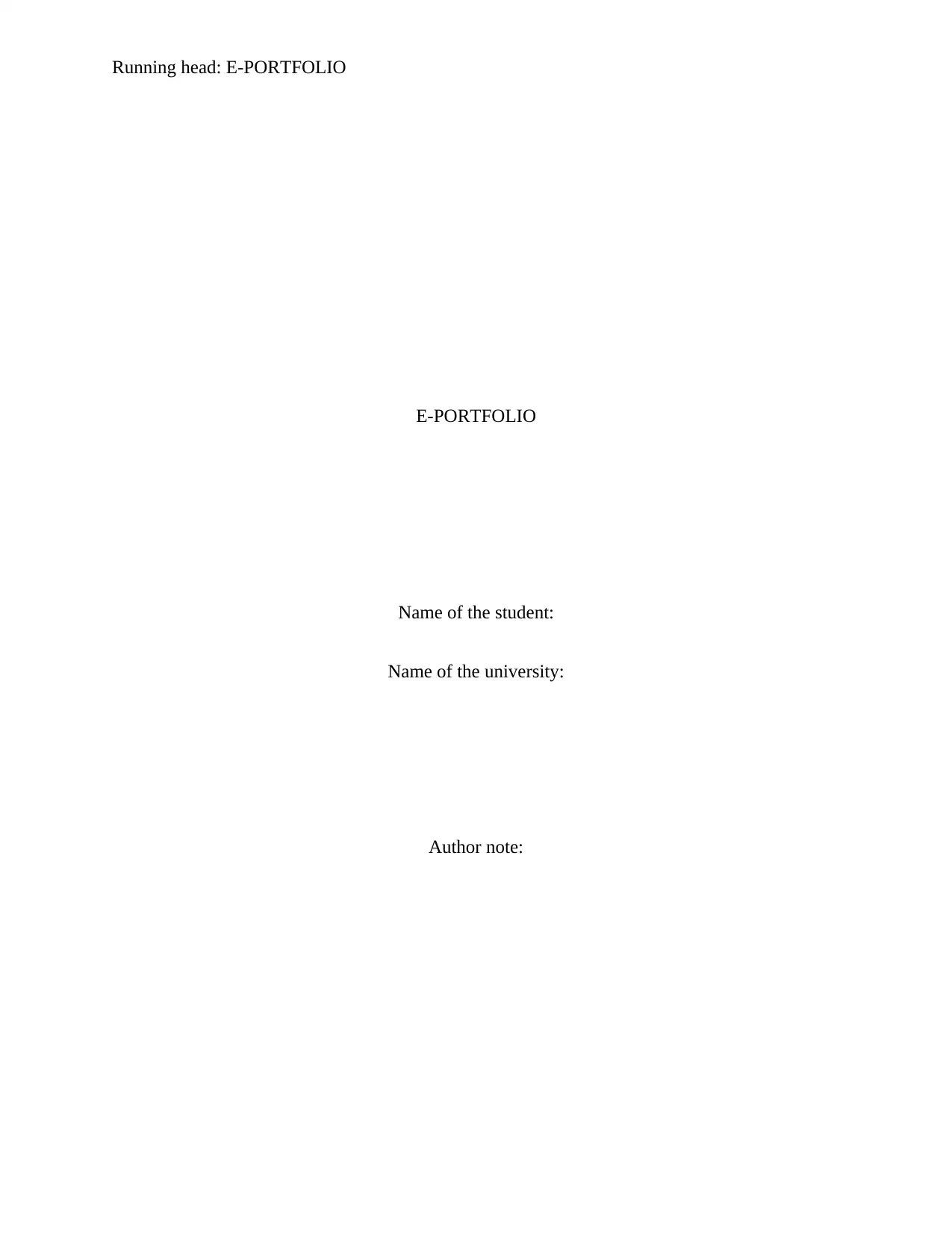
Running head: E-PORTFOLIO
E-PORTFOLIO
Name of the student:
Name of the university:
Author note:
E-PORTFOLIO
Name of the student:
Name of the university:
Author note:
Paraphrase This Document
Need a fresh take? Get an instant paraphrase of this document with our AI Paraphraser
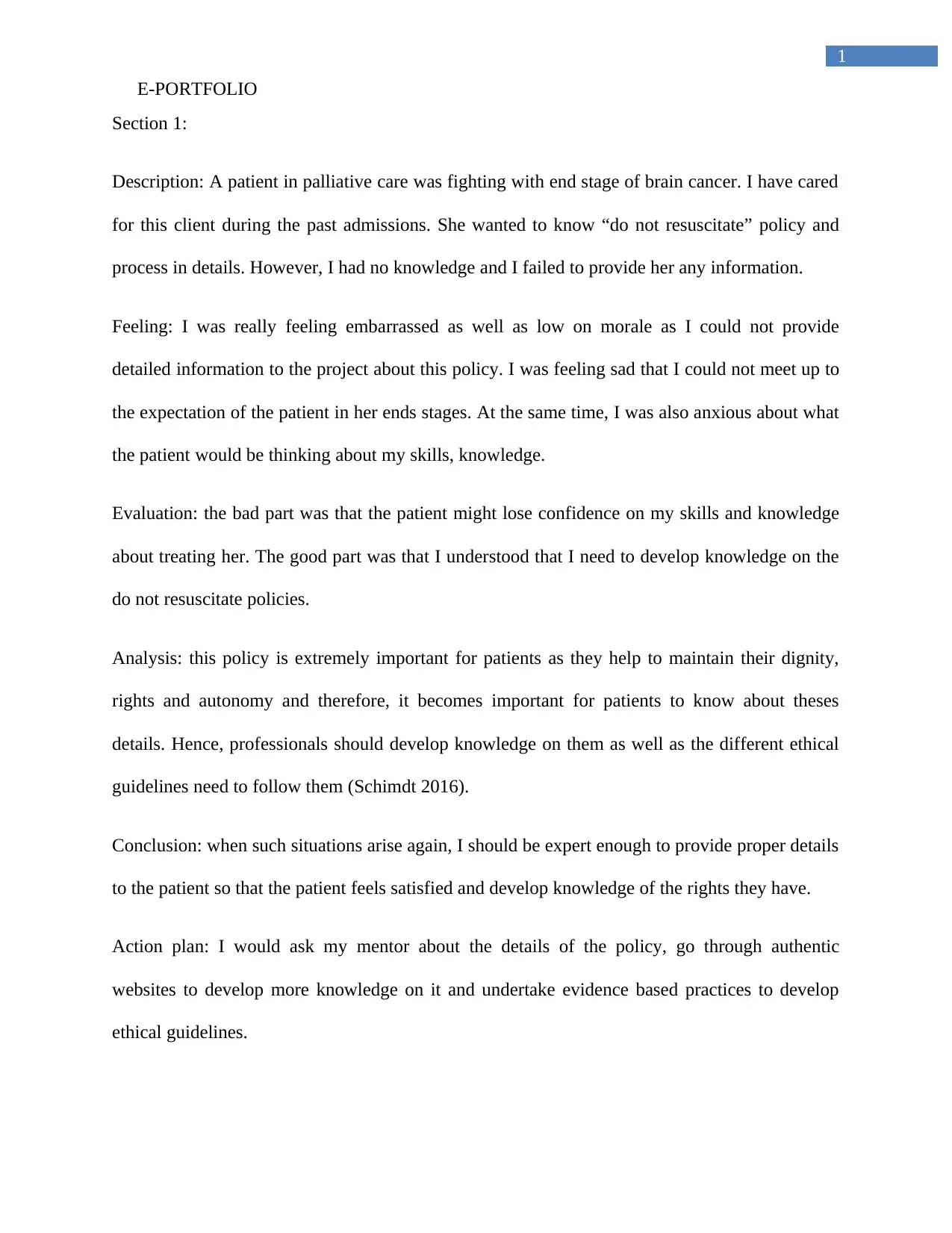
1
E-PORTFOLIO
Section 1:
Description: A patient in palliative care was fighting with end stage of brain cancer. I have cared
for this client during the past admissions. She wanted to know “do not resuscitate” policy and
process in details. However, I had no knowledge and I failed to provide her any information.
Feeling: I was really feeling embarrassed as well as low on morale as I could not provide
detailed information to the project about this policy. I was feeling sad that I could not meet up to
the expectation of the patient in her ends stages. At the same time, I was also anxious about what
the patient would be thinking about my skills, knowledge.
Evaluation: the bad part was that the patient might lose confidence on my skills and knowledge
about treating her. The good part was that I understood that I need to develop knowledge on the
do not resuscitate policies.
Analysis: this policy is extremely important for patients as they help to maintain their dignity,
rights and autonomy and therefore, it becomes important for patients to know about theses
details. Hence, professionals should develop knowledge on them as well as the different ethical
guidelines need to follow them (Schimdt 2016).
Conclusion: when such situations arise again, I should be expert enough to provide proper details
to the patient so that the patient feels satisfied and develop knowledge of the rights they have.
Action plan: I would ask my mentor about the details of the policy, go through authentic
websites to develop more knowledge on it and undertake evidence based practices to develop
ethical guidelines.
E-PORTFOLIO
Section 1:
Description: A patient in palliative care was fighting with end stage of brain cancer. I have cared
for this client during the past admissions. She wanted to know “do not resuscitate” policy and
process in details. However, I had no knowledge and I failed to provide her any information.
Feeling: I was really feeling embarrassed as well as low on morale as I could not provide
detailed information to the project about this policy. I was feeling sad that I could not meet up to
the expectation of the patient in her ends stages. At the same time, I was also anxious about what
the patient would be thinking about my skills, knowledge.
Evaluation: the bad part was that the patient might lose confidence on my skills and knowledge
about treating her. The good part was that I understood that I need to develop knowledge on the
do not resuscitate policies.
Analysis: this policy is extremely important for patients as they help to maintain their dignity,
rights and autonomy and therefore, it becomes important for patients to know about theses
details. Hence, professionals should develop knowledge on them as well as the different ethical
guidelines need to follow them (Schimdt 2016).
Conclusion: when such situations arise again, I should be expert enough to provide proper details
to the patient so that the patient feels satisfied and develop knowledge of the rights they have.
Action plan: I would ask my mentor about the details of the policy, go through authentic
websites to develop more knowledge on it and undertake evidence based practices to develop
ethical guidelines.
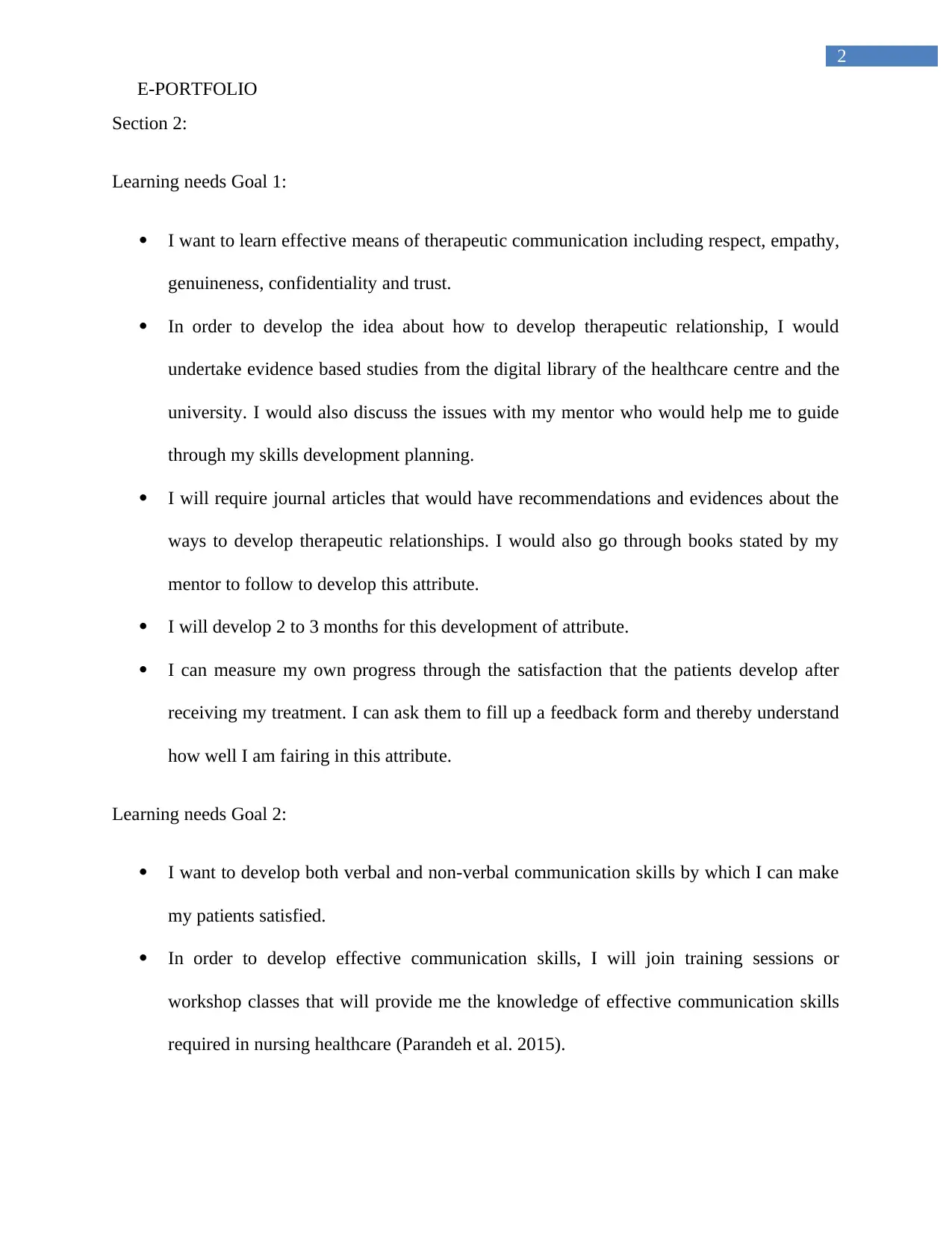
2
E-PORTFOLIO
Section 2:
Learning needs Goal 1:
I want to learn effective means of therapeutic communication including respect, empathy,
genuineness, confidentiality and trust.
In order to develop the idea about how to develop therapeutic relationship, I would
undertake evidence based studies from the digital library of the healthcare centre and the
university. I would also discuss the issues with my mentor who would help me to guide
through my skills development planning.
I will require journal articles that would have recommendations and evidences about the
ways to develop therapeutic relationships. I would also go through books stated by my
mentor to follow to develop this attribute.
I will develop 2 to 3 months for this development of attribute.
I can measure my own progress through the satisfaction that the patients develop after
receiving my treatment. I can ask them to fill up a feedback form and thereby understand
how well I am fairing in this attribute.
Learning needs Goal 2:
I want to develop both verbal and non-verbal communication skills by which I can make
my patients satisfied.
In order to develop effective communication skills, I will join training sessions or
workshop classes that will provide me the knowledge of effective communication skills
required in nursing healthcare (Parandeh et al. 2015).
E-PORTFOLIO
Section 2:
Learning needs Goal 1:
I want to learn effective means of therapeutic communication including respect, empathy,
genuineness, confidentiality and trust.
In order to develop the idea about how to develop therapeutic relationship, I would
undertake evidence based studies from the digital library of the healthcare centre and the
university. I would also discuss the issues with my mentor who would help me to guide
through my skills development planning.
I will require journal articles that would have recommendations and evidences about the
ways to develop therapeutic relationships. I would also go through books stated by my
mentor to follow to develop this attribute.
I will develop 2 to 3 months for this development of attribute.
I can measure my own progress through the satisfaction that the patients develop after
receiving my treatment. I can ask them to fill up a feedback form and thereby understand
how well I am fairing in this attribute.
Learning needs Goal 2:
I want to develop both verbal and non-verbal communication skills by which I can make
my patients satisfied.
In order to develop effective communication skills, I will join training sessions or
workshop classes that will provide me the knowledge of effective communication skills
required in nursing healthcare (Parandeh et al. 2015).
⊘ This is a preview!⊘
Do you want full access?
Subscribe today to unlock all pages.

Trusted by 1+ million students worldwide
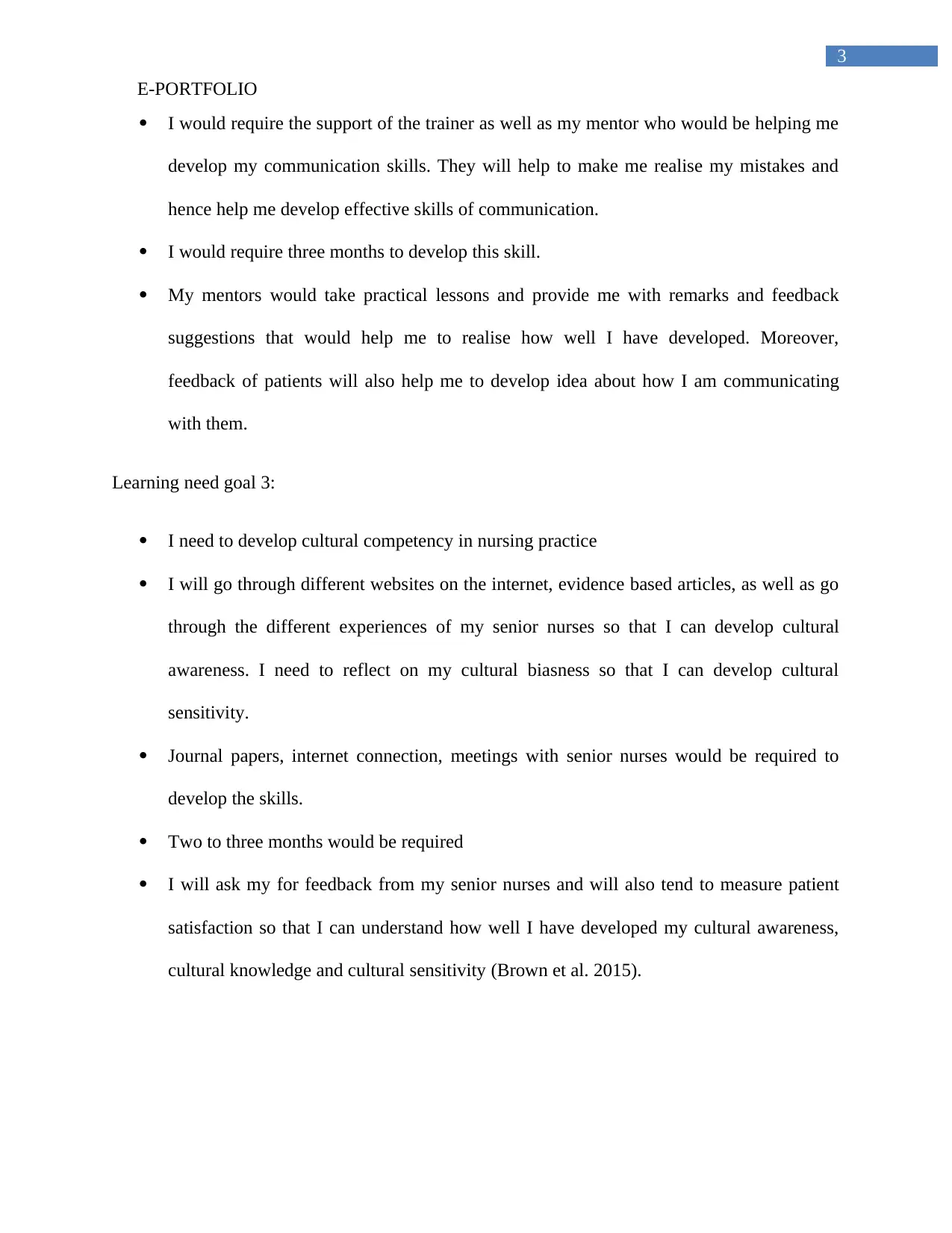
3
E-PORTFOLIO
I would require the support of the trainer as well as my mentor who would be helping me
develop my communication skills. They will help to make me realise my mistakes and
hence help me develop effective skills of communication.
I would require three months to develop this skill.
My mentors would take practical lessons and provide me with remarks and feedback
suggestions that would help me to realise how well I have developed. Moreover,
feedback of patients will also help me to develop idea about how I am communicating
with them.
Learning need goal 3:
I need to develop cultural competency in nursing practice
I will go through different websites on the internet, evidence based articles, as well as go
through the different experiences of my senior nurses so that I can develop cultural
awareness. I need to reflect on my cultural biasness so that I can develop cultural
sensitivity.
Journal papers, internet connection, meetings with senior nurses would be required to
develop the skills.
Two to three months would be required
I will ask my for feedback from my senior nurses and will also tend to measure patient
satisfaction so that I can understand how well I have developed my cultural awareness,
cultural knowledge and cultural sensitivity (Brown et al. 2015).
E-PORTFOLIO
I would require the support of the trainer as well as my mentor who would be helping me
develop my communication skills. They will help to make me realise my mistakes and
hence help me develop effective skills of communication.
I would require three months to develop this skill.
My mentors would take practical lessons and provide me with remarks and feedback
suggestions that would help me to realise how well I have developed. Moreover,
feedback of patients will also help me to develop idea about how I am communicating
with them.
Learning need goal 3:
I need to develop cultural competency in nursing practice
I will go through different websites on the internet, evidence based articles, as well as go
through the different experiences of my senior nurses so that I can develop cultural
awareness. I need to reflect on my cultural biasness so that I can develop cultural
sensitivity.
Journal papers, internet connection, meetings with senior nurses would be required to
develop the skills.
Two to three months would be required
I will ask my for feedback from my senior nurses and will also tend to measure patient
satisfaction so that I can understand how well I have developed my cultural awareness,
cultural knowledge and cultural sensitivity (Brown et al. 2015).
Paraphrase This Document
Need a fresh take? Get an instant paraphrase of this document with our AI Paraphraser
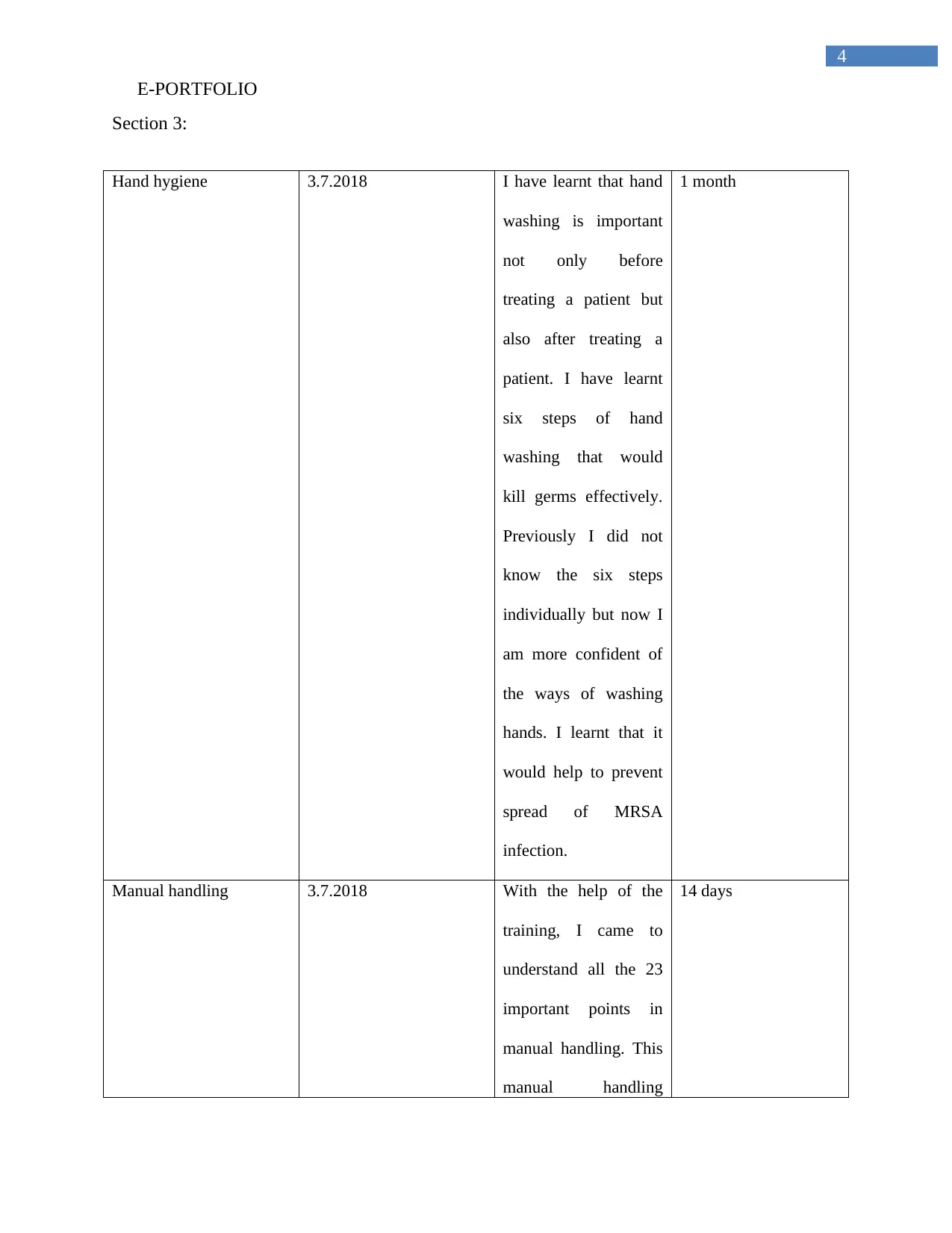
4
E-PORTFOLIO
Section 3:
Hand hygiene 3.7.2018 I have learnt that hand
washing is important
not only before
treating a patient but
also after treating a
patient. I have learnt
six steps of hand
washing that would
kill germs effectively.
Previously I did not
know the six steps
individually but now I
am more confident of
the ways of washing
hands. I learnt that it
would help to prevent
spread of MRSA
infection.
1 month
Manual handling 3.7.2018 With the help of the
training, I came to
understand all the 23
important points in
manual handling. This
manual handling
14 days
E-PORTFOLIO
Section 3:
Hand hygiene 3.7.2018 I have learnt that hand
washing is important
not only before
treating a patient but
also after treating a
patient. I have learnt
six steps of hand
washing that would
kill germs effectively.
Previously I did not
know the six steps
individually but now I
am more confident of
the ways of washing
hands. I learnt that it
would help to prevent
spread of MRSA
infection.
1 month
Manual handling 3.7.2018 With the help of the
training, I came to
understand all the 23
important points in
manual handling. This
manual handling
14 days
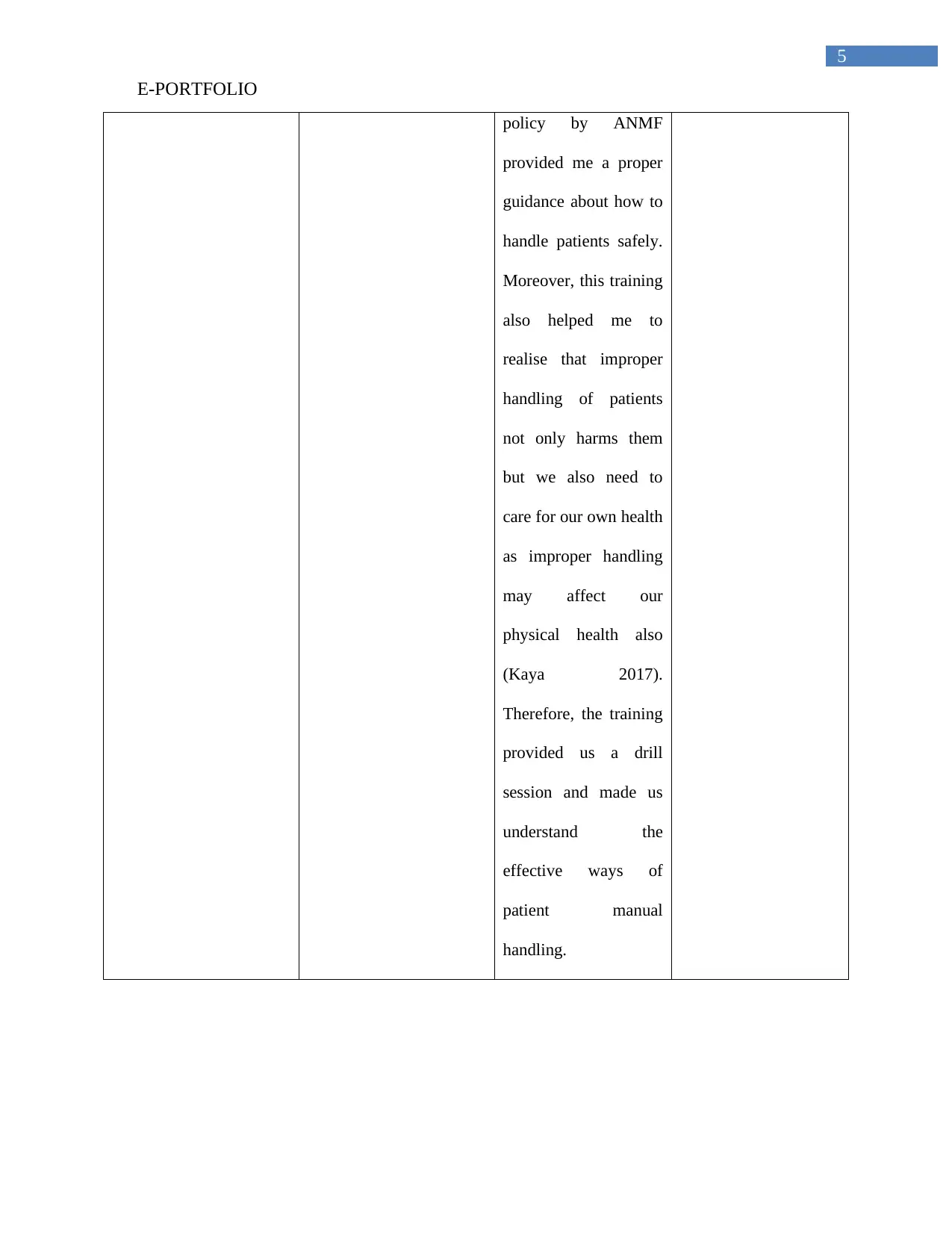
5
E-PORTFOLIO
policy by ANMF
provided me a proper
guidance about how to
handle patients safely.
Moreover, this training
also helped me to
realise that improper
handling of patients
not only harms them
but we also need to
care for our own health
as improper handling
may affect our
physical health also
(Kaya 2017).
Therefore, the training
provided us a drill
session and made us
understand the
effective ways of
patient manual
handling.
E-PORTFOLIO
policy by ANMF
provided me a proper
guidance about how to
handle patients safely.
Moreover, this training
also helped me to
realise that improper
handling of patients
not only harms them
but we also need to
care for our own health
as improper handling
may affect our
physical health also
(Kaya 2017).
Therefore, the training
provided us a drill
session and made us
understand the
effective ways of
patient manual
handling.
⊘ This is a preview!⊘
Do you want full access?
Subscribe today to unlock all pages.

Trusted by 1+ million students worldwide
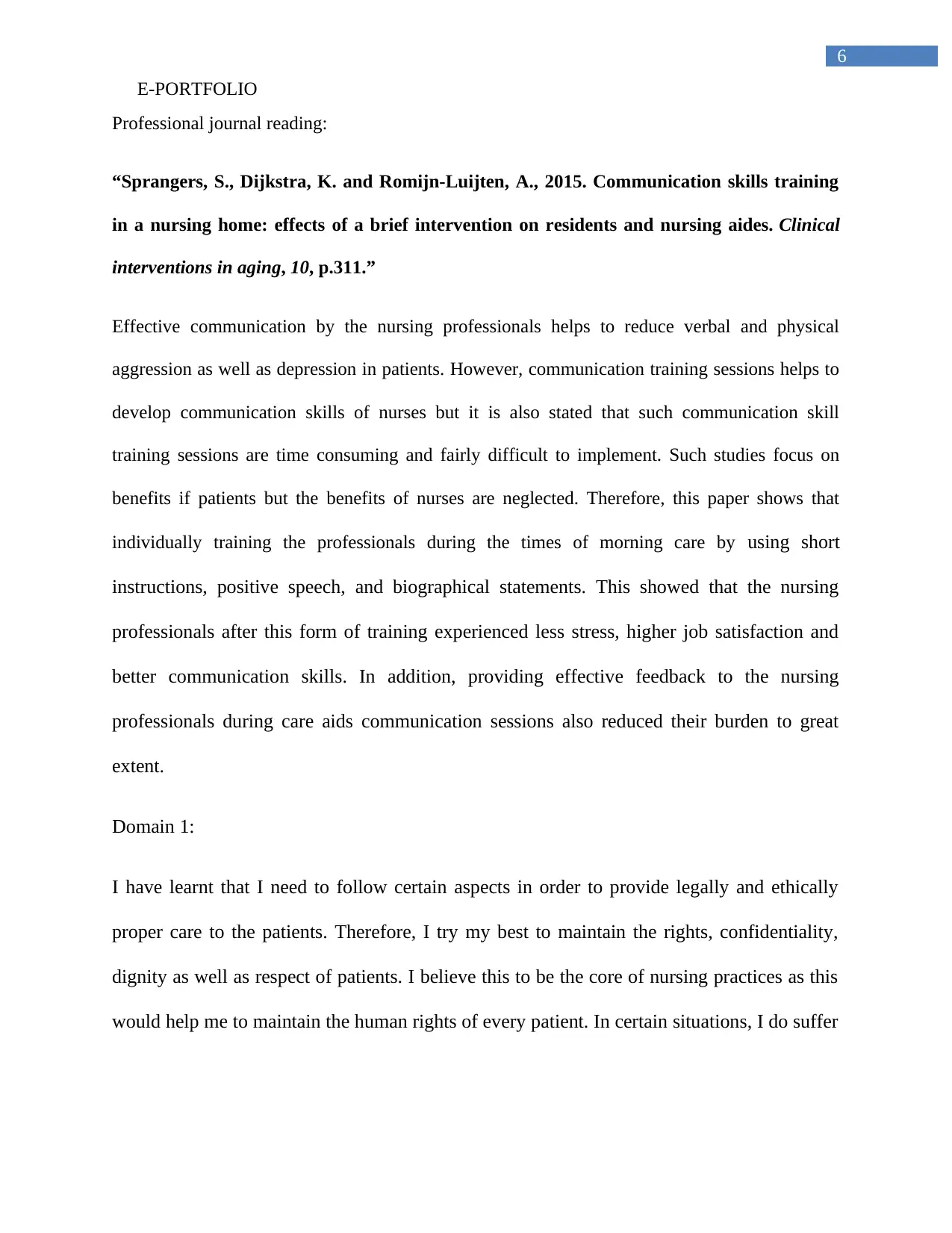
6
E-PORTFOLIO
Professional journal reading:
“Sprangers, S., Dijkstra, K. and Romijn-Luijten, A., 2015. Communication skills training
in a nursing home: effects of a brief intervention on residents and nursing aides. Clinical
interventions in aging, 10, p.311.”
Effective communication by the nursing professionals helps to reduce verbal and physical
aggression as well as depression in patients. However, communication training sessions helps to
develop communication skills of nurses but it is also stated that such communication skill
training sessions are time consuming and fairly difficult to implement. Such studies focus on
benefits if patients but the benefits of nurses are neglected. Therefore, this paper shows that
individually training the professionals during the times of morning care by using short
instructions, positive speech, and biographical statements. This showed that the nursing
professionals after this form of training experienced less stress, higher job satisfaction and
better communication skills. In addition, providing effective feedback to the nursing
professionals during care aids communication sessions also reduced their burden to great
extent.
Domain 1:
I have learnt that I need to follow certain aspects in order to provide legally and ethically
proper care to the patients. Therefore, I try my best to maintain the rights, confidentiality,
dignity as well as respect of patients. I believe this to be the core of nursing practices as this
would help me to maintain the human rights of every patient. In certain situations, I do suffer
E-PORTFOLIO
Professional journal reading:
“Sprangers, S., Dijkstra, K. and Romijn-Luijten, A., 2015. Communication skills training
in a nursing home: effects of a brief intervention on residents and nursing aides. Clinical
interventions in aging, 10, p.311.”
Effective communication by the nursing professionals helps to reduce verbal and physical
aggression as well as depression in patients. However, communication training sessions helps to
develop communication skills of nurses but it is also stated that such communication skill
training sessions are time consuming and fairly difficult to implement. Such studies focus on
benefits if patients but the benefits of nurses are neglected. Therefore, this paper shows that
individually training the professionals during the times of morning care by using short
instructions, positive speech, and biographical statements. This showed that the nursing
professionals after this form of training experienced less stress, higher job satisfaction and
better communication skills. In addition, providing effective feedback to the nursing
professionals during care aids communication sessions also reduced their burden to great
extent.
Domain 1:
I have learnt that I need to follow certain aspects in order to provide legally and ethically
proper care to the patients. Therefore, I try my best to maintain the rights, confidentiality,
dignity as well as respect of patients. I believe this to be the core of nursing practices as this
would help me to maintain the human rights of every patient. In certain situations, I do suffer
Paraphrase This Document
Need a fresh take? Get an instant paraphrase of this document with our AI Paraphraser
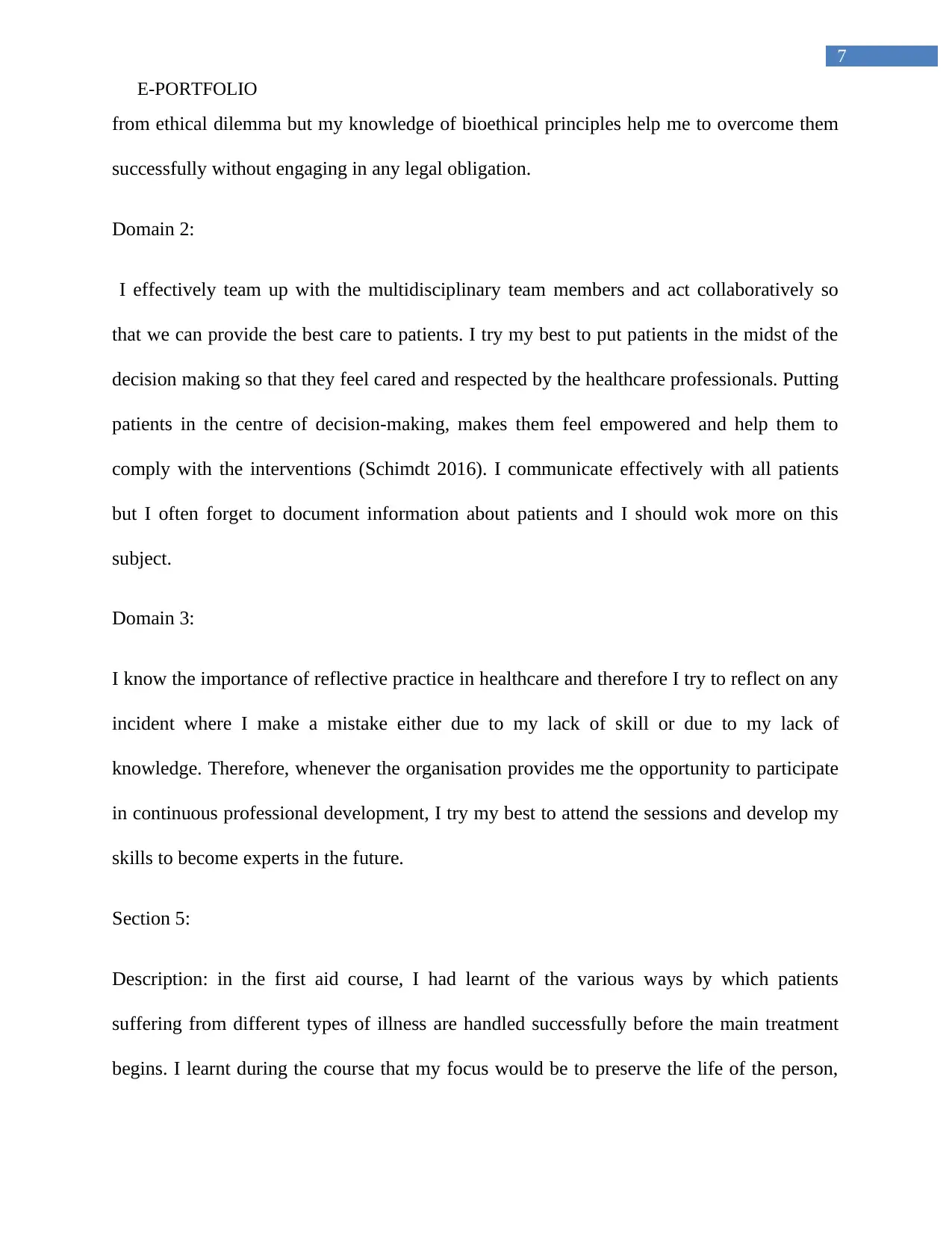
7
E-PORTFOLIO
from ethical dilemma but my knowledge of bioethical principles help me to overcome them
successfully without engaging in any legal obligation.
Domain 2:
I effectively team up with the multidisciplinary team members and act collaboratively so
that we can provide the best care to patients. I try my best to put patients in the midst of the
decision making so that they feel cared and respected by the healthcare professionals. Putting
patients in the centre of decision-making, makes them feel empowered and help them to
comply with the interventions (Schimdt 2016). I communicate effectively with all patients
but I often forget to document information about patients and I should wok more on this
subject.
Domain 3:
I know the importance of reflective practice in healthcare and therefore I try to reflect on any
incident where I make a mistake either due to my lack of skill or due to my lack of
knowledge. Therefore, whenever the organisation provides me the opportunity to participate
in continuous professional development, I try my best to attend the sessions and develop my
skills to become experts in the future.
Section 5:
Description: in the first aid course, I had learnt of the various ways by which patients
suffering from different types of illness are handled successfully before the main treatment
begins. I learnt during the course that my focus would be to preserve the life of the person,
E-PORTFOLIO
from ethical dilemma but my knowledge of bioethical principles help me to overcome them
successfully without engaging in any legal obligation.
Domain 2:
I effectively team up with the multidisciplinary team members and act collaboratively so
that we can provide the best care to patients. I try my best to put patients in the midst of the
decision making so that they feel cared and respected by the healthcare professionals. Putting
patients in the centre of decision-making, makes them feel empowered and help them to
comply with the interventions (Schimdt 2016). I communicate effectively with all patients
but I often forget to document information about patients and I should wok more on this
subject.
Domain 3:
I know the importance of reflective practice in healthcare and therefore I try to reflect on any
incident where I make a mistake either due to my lack of skill or due to my lack of
knowledge. Therefore, whenever the organisation provides me the opportunity to participate
in continuous professional development, I try my best to attend the sessions and develop my
skills to become experts in the future.
Section 5:
Description: in the first aid course, I had learnt of the various ways by which patients
suffering from different types of illness are handled successfully before the main treatment
begins. I learnt during the course that my focus would be to preserve the life of the person,
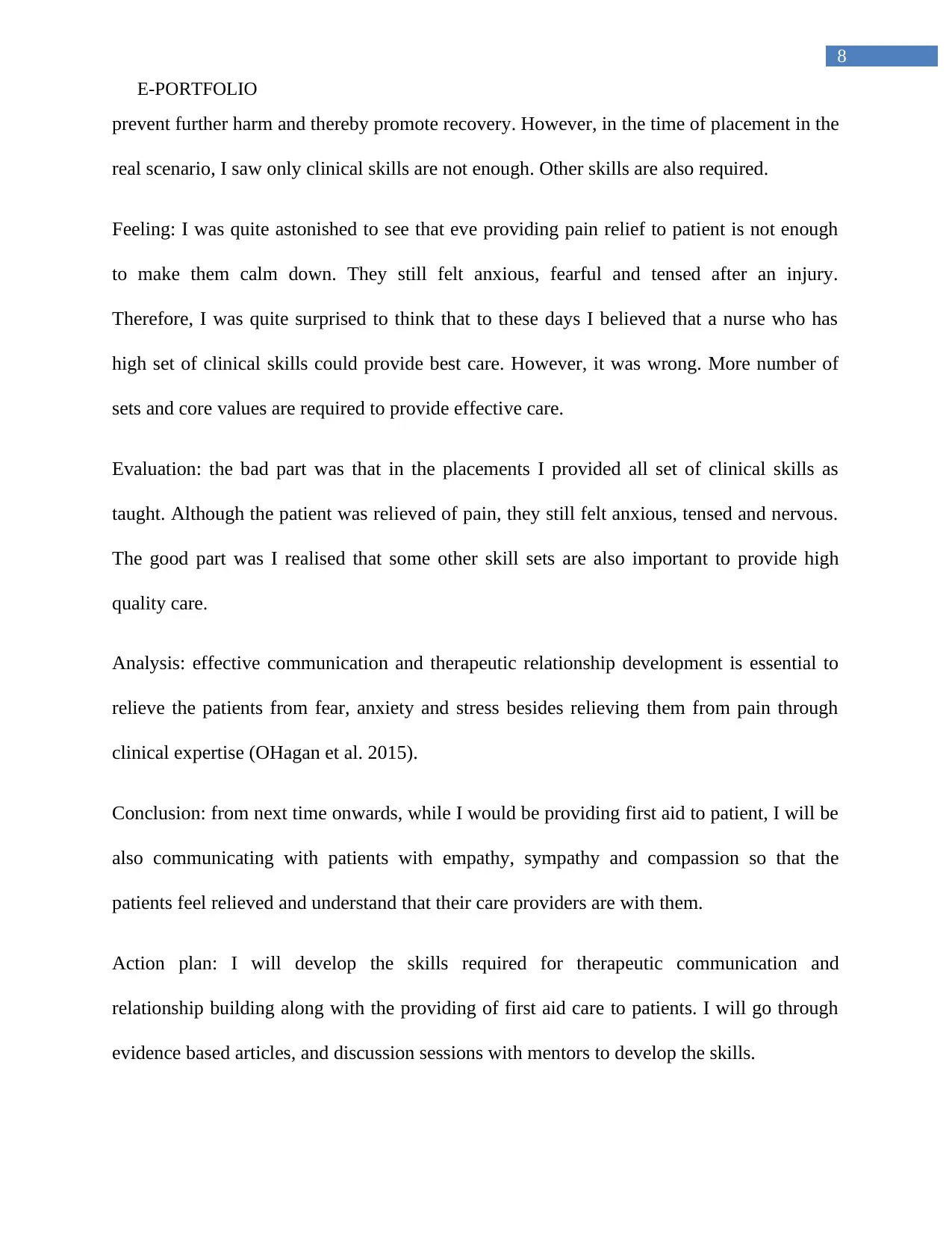
8
E-PORTFOLIO
prevent further harm and thereby promote recovery. However, in the time of placement in the
real scenario, I saw only clinical skills are not enough. Other skills are also required.
Feeling: I was quite astonished to see that eve providing pain relief to patient is not enough
to make them calm down. They still felt anxious, fearful and tensed after an injury.
Therefore, I was quite surprised to think that to these days I believed that a nurse who has
high set of clinical skills could provide best care. However, it was wrong. More number of
sets and core values are required to provide effective care.
Evaluation: the bad part was that in the placements I provided all set of clinical skills as
taught. Although the patient was relieved of pain, they still felt anxious, tensed and nervous.
The good part was I realised that some other skill sets are also important to provide high
quality care.
Analysis: effective communication and therapeutic relationship development is essential to
relieve the patients from fear, anxiety and stress besides relieving them from pain through
clinical expertise (OHagan et al. 2015).
Conclusion: from next time onwards, while I would be providing first aid to patient, I will be
also communicating with patients with empathy, sympathy and compassion so that the
patients feel relieved and understand that their care providers are with them.
Action plan: I will develop the skills required for therapeutic communication and
relationship building along with the providing of first aid care to patients. I will go through
evidence based articles, and discussion sessions with mentors to develop the skills.
E-PORTFOLIO
prevent further harm and thereby promote recovery. However, in the time of placement in the
real scenario, I saw only clinical skills are not enough. Other skills are also required.
Feeling: I was quite astonished to see that eve providing pain relief to patient is not enough
to make them calm down. They still felt anxious, fearful and tensed after an injury.
Therefore, I was quite surprised to think that to these days I believed that a nurse who has
high set of clinical skills could provide best care. However, it was wrong. More number of
sets and core values are required to provide effective care.
Evaluation: the bad part was that in the placements I provided all set of clinical skills as
taught. Although the patient was relieved of pain, they still felt anxious, tensed and nervous.
The good part was I realised that some other skill sets are also important to provide high
quality care.
Analysis: effective communication and therapeutic relationship development is essential to
relieve the patients from fear, anxiety and stress besides relieving them from pain through
clinical expertise (OHagan et al. 2015).
Conclusion: from next time onwards, while I would be providing first aid to patient, I will be
also communicating with patients with empathy, sympathy and compassion so that the
patients feel relieved and understand that their care providers are with them.
Action plan: I will develop the skills required for therapeutic communication and
relationship building along with the providing of first aid care to patients. I will go through
evidence based articles, and discussion sessions with mentors to develop the skills.
⊘ This is a preview!⊘
Do you want full access?
Subscribe today to unlock all pages.

Trusted by 1+ million students worldwide
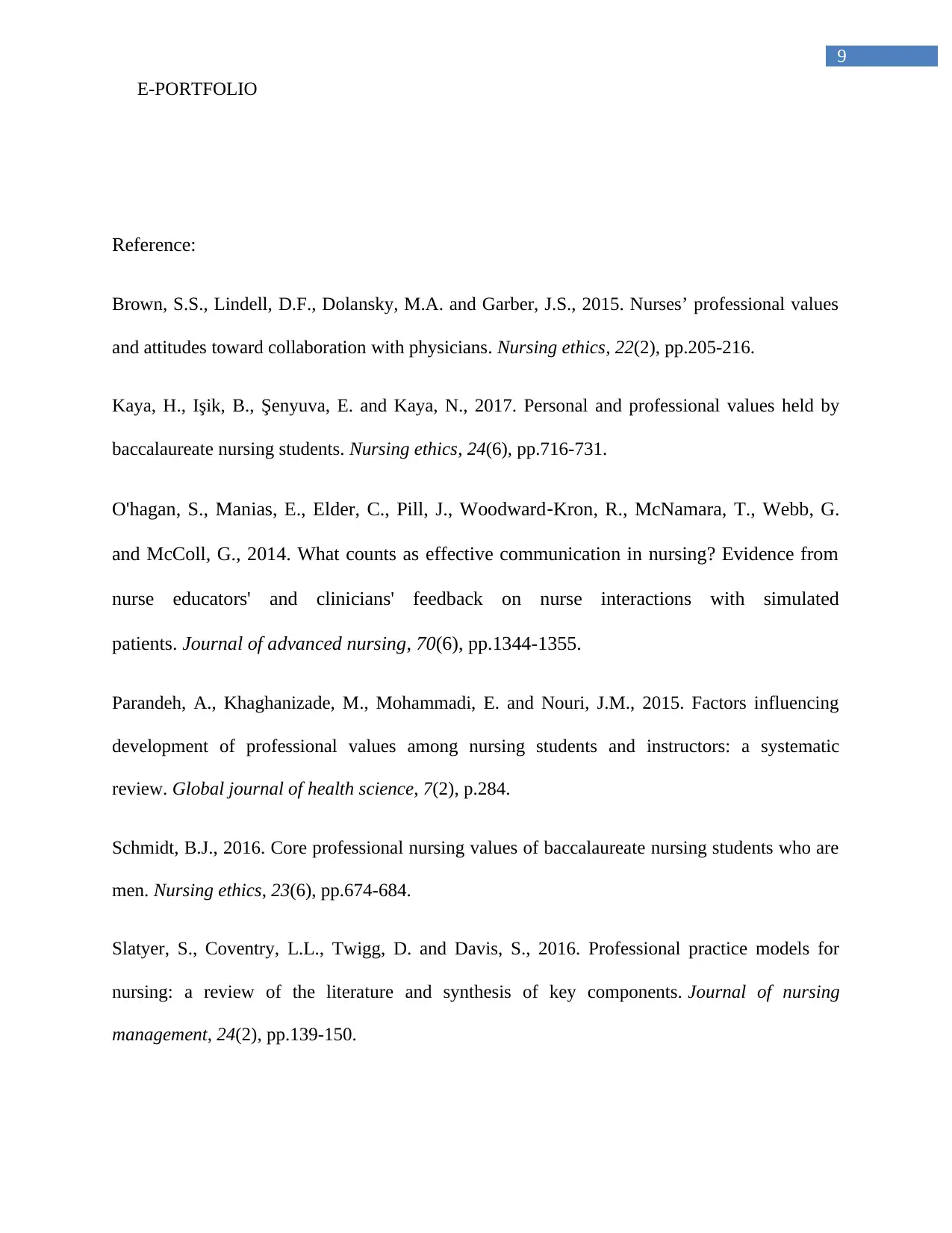
9
E-PORTFOLIO
Reference:
Brown, S.S., Lindell, D.F., Dolansky, M.A. and Garber, J.S., 2015. Nurses’ professional values
and attitudes toward collaboration with physicians. Nursing ethics, 22(2), pp.205-216.
Kaya, H., Işik, B., Şenyuva, E. and Kaya, N., 2017. Personal and professional values held by
baccalaureate nursing students. Nursing ethics, 24(6), pp.716-731.
O'hagan, S., Manias, E., Elder, C., Pill, J., Woodward‐Kron, R., McNamara, T., Webb, G.
and McColl, G., 2014. What counts as effective communication in nursing? Evidence from
nurse educators' and clinicians' feedback on nurse interactions with simulated
patients. Journal of advanced nursing, 70(6), pp.1344-1355.
Parandeh, A., Khaghanizade, M., Mohammadi, E. and Nouri, J.M., 2015. Factors influencing
development of professional values among nursing students and instructors: a systematic
review. Global journal of health science, 7(2), p.284.
Schmidt, B.J., 2016. Core professional nursing values of baccalaureate nursing students who are
men. Nursing ethics, 23(6), pp.674-684.
Slatyer, S., Coventry, L.L., Twigg, D. and Davis, S., 2016. Professional practice models for
nursing: a review of the literature and synthesis of key components. Journal of nursing
management, 24(2), pp.139-150.
E-PORTFOLIO
Reference:
Brown, S.S., Lindell, D.F., Dolansky, M.A. and Garber, J.S., 2015. Nurses’ professional values
and attitudes toward collaboration with physicians. Nursing ethics, 22(2), pp.205-216.
Kaya, H., Işik, B., Şenyuva, E. and Kaya, N., 2017. Personal and professional values held by
baccalaureate nursing students. Nursing ethics, 24(6), pp.716-731.
O'hagan, S., Manias, E., Elder, C., Pill, J., Woodward‐Kron, R., McNamara, T., Webb, G.
and McColl, G., 2014. What counts as effective communication in nursing? Evidence from
nurse educators' and clinicians' feedback on nurse interactions with simulated
patients. Journal of advanced nursing, 70(6), pp.1344-1355.
Parandeh, A., Khaghanizade, M., Mohammadi, E. and Nouri, J.M., 2015. Factors influencing
development of professional values among nursing students and instructors: a systematic
review. Global journal of health science, 7(2), p.284.
Schmidt, B.J., 2016. Core professional nursing values of baccalaureate nursing students who are
men. Nursing ethics, 23(6), pp.674-684.
Slatyer, S., Coventry, L.L., Twigg, D. and Davis, S., 2016. Professional practice models for
nursing: a review of the literature and synthesis of key components. Journal of nursing
management, 24(2), pp.139-150.
1 out of 10
Related Documents
Your All-in-One AI-Powered Toolkit for Academic Success.
+13062052269
info@desklib.com
Available 24*7 on WhatsApp / Email
![[object Object]](/_next/static/media/star-bottom.7253800d.svg)
Unlock your academic potential
Copyright © 2020–2026 A2Z Services. All Rights Reserved. Developed and managed by ZUCOL.





